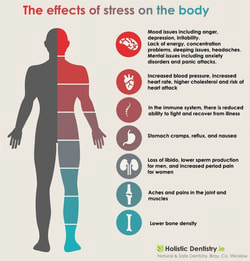Stress and Its Negative Effects

What exactly is Stress?
Stress is a normal component of the body’s response to demands that are placed on it. When we are frightened or angry, the body responds to this stress with a number of physical reactions that prepare it for action. Factors that trigger this stress response are known as stressors. However, our stress response in our body is based on ancient stressors – the “fight or flight” response.
Back in the stone age, stressors were things like hungry mammoths looking for (human) prey, or struggling to find food for our family, or fighting another cave man for the remains of an animal – primitive, ‘gut’ reactions. So when we are stressed today, our bodies still respond in the old, physical way.
What is a Stressor?
Anything that we find difficult to cope with over a prolonged period:
Financial worries – from simply paying the bills, to arrears, to excessive debt.Marriage difficulties or family problems – communication, specific problems with a spouse or child, illness in the family, caring for anyone with special needs or an elderly parent/relative.
Work place stress – bullying, work overload, work boredom, physical conditions in the workplace including excessive heat/noise/cold or a poorly designed work place with little or no access to natural light and/or fresh air.Lack of skills or strategies in combating or neutralising stress. See Myths about Stress further down for some suggestions.
Physical Effects of Stress

What does this mean for your health?
Our heart rate increases so more blood pumps to our legs and arms, so we can run away, or fight – so we feel increased palpitations and anxiety inside. The long term effect is increased blood pressure and pressure on our heart, leading to anything from angina to a heart attack,
Our normal bodily functions stop or slow down, so all our energy can go into running away, or fighting - digestion, immune function, reproduction – none of these are vitally important in the face of a woolly mammoth bearing down on us, so they all suspend normal functioning. Prolonged stress can therefore lead to stomach ulcers, continued ill health or being generally run down, and infertility.
More fatty acids and cholesterol being produced over a prolonged period leads to obesity and higher cholesterol. Increased blood sugar (glucose) leads to Type II diabetes. Often clients who are stressed will eat emotionally or find they cannot stop binge eating, and this type of disordered eating contributes further to increased cortisol and reduced serotonin - resulting in a vicious cycle.
What are the most common signs of stress?
Eating disturbances – eating too much, or lack of appetite and weight loss;
Sleeping disturbances – not being able to sleep, or ‘early waking’, i.e. waking in the middle of the night and not being able to get back to sleep;
Lack of concentration and short term memory – forgetfulness;
Lack of interest in our usual hobbies or pastimes;
Irritibility with work colleagues and family/friends, short tempered and unsociable;
Loss of libido or sex drive;
Lack of energy – feeling tired all the time, no motivation to exercise or engage in our normal sports or hobbies.
If you are experiencing three or more of these symptoms, you are almost certainly experiencing stress.
SIX MYTHS ABOUT STRESS, AND SOME SOLUTIONS...
Here are some of the common myths surrounding stress and some strategies for stress reduction.
Myth 1: Stress is the same for everybody.
Stress is not the same for everybody, nor does everyone experience stress in the same way. Stress is different for each and every one of us. What is stressful for one person may or may not be stressful for another; each of us responds to stress in an entirely different way.
We all also deal with stress in a different way. For some, learning how to relax or meditate could work, for someone else it’s training for a marathon or playing a competitive team sport. It’s about finding what works for you and gives you the time and space you need to forget about your stressors and relax.
Myth 2: Stress is always bad for you.
According to this view, zero stress makes us happy and healthy. But this is wrong — stress is to the human condition what tension is to the violin string: too little and the music is dull and raspy; too much and the music is shrill or the string snaps.
Stress in and of itself is not bad (especially in small amounts). So while stress can be the kiss of death or the spice of life, the key is to understand how best to manage it.
Managing stress makes us productive and happy, while mismanaging it may hurt us and cause us to fail or become even more stressed.
Myth 3: Stress is everywhere, so you can’t do anything about it.
So is the possibility of getting into a car accident everytime we get into our cars, but we don’t allow that to stop us from driving. You can plan your life so that stress does not overwhelm you. Effective planning involves setting priorities and working on simple problems first, solving them, and then going on to more complex difficulties. When stress is mismanaged, it’s difficult to prioritize. All your problems seem to be equal and stress seems to be everywhere.
Time and task management sound very simple, but many of us fail to put them into practice. Taking the time each day in work to write out a list of tasks and prioritise them can make achieving daily goals a lot easier. Crossing off tasks on a list is satisfying and shows us how much we achieve each day. It also helps us become better at understanding how much we can reasonably expect to achieve each day. Starting the day with a mile long list of things to do in our heads is an almost guaranteed way to fail. When we are overwhelmed like this, we usually respond by ignoring the list and doing something completely different instead. This is not helpful.
Myth 4: The most popular techniques for reducing stress are the best ones.
No universally effective stress reduction techniques exist (although many magazine articles and pop psychology articles claim to know them!). We are all different — our lives are different, our situations are different, and our reactions are different. A comprehensive stress management program tailored to the individual works best, and working with someone in a systematic way to learn strategies and put them into practice can be immensely helpful. For one person, it's daily meditation, for another, it's exercise, for someone else, it is connecting with friends and loved ones - we each have our own ways of coping.
Common effective stress management techniques include:
Relaxation and meditation – see the exercise links on the Relaxation Page;
Regular exercise – walking, jogging, yoga, pilates, cycling, team sports… you decide! Exercise pumps endorphins (feel good hormones) through our body. And although you think you don't 'feel like it', as my mother used to say - You'll never feel worse when you get back home!
Taking time out to read or listen to music;
Spending time with family or friends, without talking about your stressors!
Regular time spent on a hobby – painting, knitting, photography, a night class, dancing, cooking, again it’s what works for you that matters. And if you don’t have any hobbies, then why not think about one you might like to start?
Myth 5: No symptoms, no stress.
An absence of symptoms does not mean the absence of stress. In fact, camouflaging symptoms with medication may deprive you of the signals you need for reducing the strain on your physiological and psychological systems. Many of us experience symptoms of stress in a very physical way, even though stress is a psychological effect. Feeling anxious, shortness of breath, or simply feeling run down all the time can all be physical signs of stress. Feeling overwhelmed, disorganized and having difficulty concentrating are common mental signs of stress.
If you do experience these ‘low grade’ symptoms then take the time to think about the pressure you are under, either personally or in work. Then decide if you can change things for the better yourself, or whether you need some help or support. If you do, then reach out and ask for it, or contact a professional. This includes your GP, and/or a counsellor.
Myth 6: Only major symptoms of stress require attention.
This myth assumes that the “minor” symptoms, such as headaches or stomach acid, may be safely ignored. Minor symptoms of stress are the early warnings that your life is getting out of hand and that you need to do a better job of managing stress. If you wait until you start feeling the “major” symptoms of stress such as a heart attack, it may be too late. Those early warning signs are best listened to earlier rather than later. A change in lifestyle, such as exercising more, to deal with those early warning signs will be far less costly, in time and economics, than dealing with the effects of not listening to them.
To Email and make an appointment with a Counsellor for some Stress Reduction Support, either Online or in person, please use our Contact Form.


